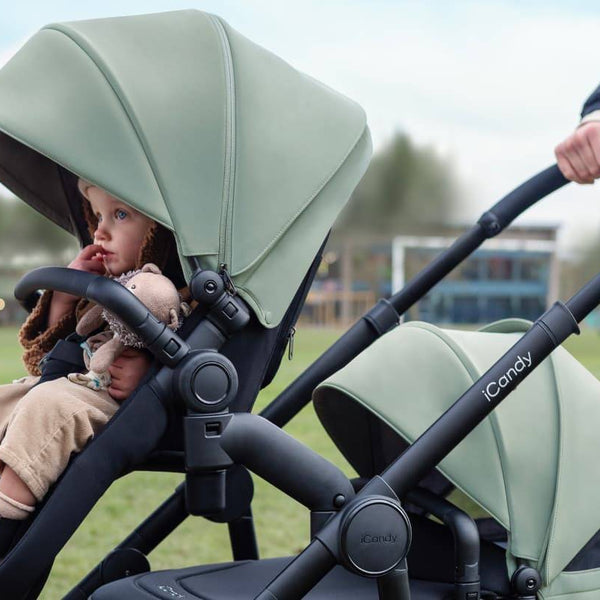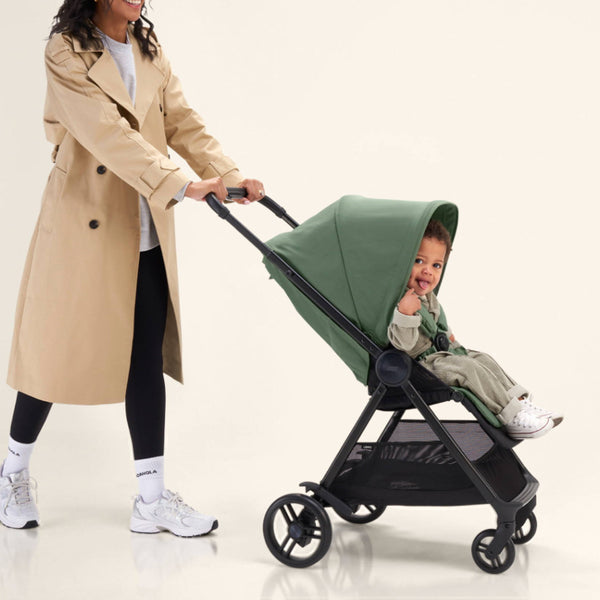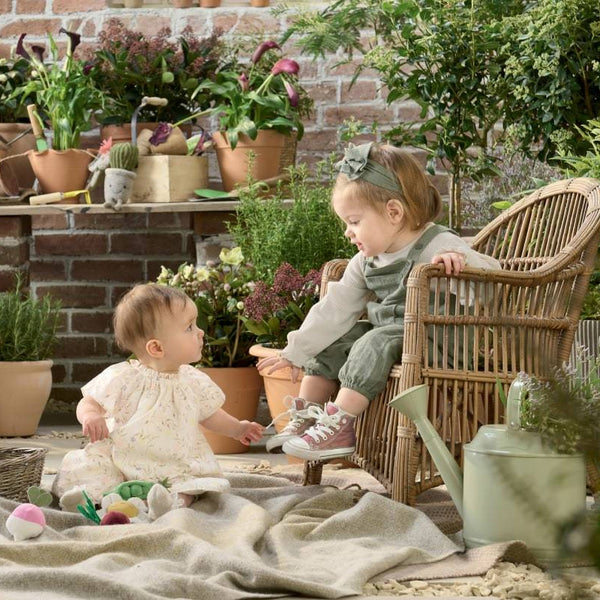Thinking about going back to work after maternity leave? Ugh. You might not want to think about it yet, or you may be clawing at the walls to get back to grown-up interaction. Either way, we've got some top tips to help you get childcare in place in time for the big return.
Going back to work after maternity leave can be a confusing time. You're just found your feet in your new life as a parent, suddenly it's time to hand your still tiny-seeming baby over to a relative stranger. Or maybe you're excited to get back to the office but are worried it won't be financially viable.
Here’s a rundown of what you need to know to help smooth the transition from the parental leave bubble back to the big wide world of work. So you can be sure you're going back to work after maternity leave with your head held high.

At what age can my baby start childcare?
Most nurseries and childminders will take babies from six weeks onwards. If you think you'll be putting your baby into childcare at this age you'll probably want to have something sorted before labour gets too close, as the first few weeks can go by in something of a blur and many childcare facilities have waiting lists.
Can I get benefits or financial help towards childcare?
If you have a full-time job, check whether your employer offers childcare vouchers. These entitle you to tax-free childcare, which effectively knocks a considerable amount off your bills. When your child is two you may be entitled to 15 hours a week free childcare, rising to 30 hours for working families when your child reaches three. You could also be eligible for Tax Credits or Universal Childcare. Enter your details at Childcare Choices to find out which benefits you can claim.
What are my options for childcare and how much do they cost?
If you're going back to work after maternity leave, there are three main paid-for childcare options: nurseries, childminders and nannies.
Nursery
A nursery is usually privately run and oversees many children at once, although no more than three children under two will be looked after by one adult at any time. That figure rises to four kids to one adult for three-year-olds and above. A nursery in the UK costs on average £222.36 a week for a full-time place (£277.84 a week in London).
Childminder
A childminder tends to work from their own home, generally caring for small groups of children; only three can be under five, with just one of those being a baby under a year old. The average full-time cost for a childminder in Britain is £212.86 a week, or £275.83 a week in London.
Nanny
A nanny usually provides dedicated care to your child/children in your own home and there are no limits to the number of kids they can oversee. A childminder is self-employed and sorts out their own tax, whereas you will be your nanny’s employer so will need to take care of any admin including National Insurance, holiday entitlement and DBS checks. A nanny will cost more than either nursery or childminder care, but fees vary a lot depending on experience, hours and what the job involves. Average weekly costs will be somewhere between £350 and £650.
If these aren't financially viable there are other options to consider...
Grandparents
Around half of all mums returning to work after having their first baby rely on grandparents for childcare. Even if they’re not able (or willing!) to take on full-time childcare, they may be able to help out one or two days a week. If either or both parents can also negotiate reduced hours, you should be able to substantially lower your childcare bill.
If you go down this route it’s wise to draw up a formal agreement to confirm, for example, who provides food and pays for outings, and what happens if the grandparent is sick or goes on holiday. They may be family but, just as you’d ask questions of a potential nanny or childminder, so you need to establish rules around discipline, chocolate ice cream before noon and so on.
Friends
A final option is to ask local friends whether anyone’s up for sharing childcare. You have to be careful with this as there are laws in place to stop people from providing unregulated childcare. In this context, you’re generally OK to make such an arrangement as long as you don’t accept any payment or goods in exchange for your time and you look after the kids in one of your homes. You should check the rules to find out if you need to register with Ofsted.
We decided to put Eddie into nursery because we felt it would be more reliable than having to count on one person. We also thought that mixing with a larger group of children and adults might be beneficial for his development. The staff are brilliant and we have no regrets
Mark, 35, Oxfordshire
How to choose the right childcare
Deciding what kind of childcare to use is not just a financial decision, although money may limit your options. You'll also need to do some research to find out what facilities are closest to your home and whether they fit around your working hours. If you enter your postcode into this government website it'll bring up all your registered local childcare options.
If you work long or unconventional hours this could affect your choice, too. Most nurseries are open 8am-6pm and are strict on timings, often charging late fees in the evening.
Childminders generally work similar hours but, depending on the individual, they may be more flexible if you discuss your needs. A nanny will be more flexible still if you can agree on a specific schedule that works for both of you.
Aside from cost and hours, you'll also want to think about your child's personality, social style and any special needs they may have. If you have a gregarious child who loves bombing around the playground and making new friends, a nursery could be the perfect environment in which they get the stimulation they need. For shy or very attached kids, a childminder could work better, at least as a bridge to pre-school or nursery.
If you decide to hire a nanny you might want to specify how much socialising time they should do. Perhaps ask them to attend groups and playgroups, that way your child has the opportunity to meet new friends and get used to larger crowds.
Finally, ask friends and acquaintances about their experiences of childcare. You never know, a strong recommendation (when backed up by a visit) might just convince you to find an extra tenner a week, or walk a mile further in the morning, to ensure your baby will be cared for, the way you want.
I had to get a nanny because my son was diagnosed with potentially life-threatening anaphylactic food allergies at five months old, and he couldn't safely be around other babies. We placed an ad on childcare.co.uk and found a fantastic nanny. The most important thing to me was that even without me there, he still felt safe and loved.
Kate, 37, Sutton
What to ask when looking at childcare
It can be a little overwhelming turning up to meet a potential carer. You'rr looking for a place that feels right in your heart, yet you don't want to neglect the practicalities. The internet is full of lists of suggested questions, here are some of the less obvious subjects you might want to address.
Routine
What does an average day look like – do they have a routine? Where do they go with the children?
Settling In
What is the usual settling in process? How will they make your child feel safe and comfortable?
Other Children
What's the age mix of any other children they're caring for at the moment?
Mealtimes
Do they provide food and, if so, what sort of meals and snacks do they serve?
Behaviour
What would they do if your child was upset? Hurt? Did something unacceptable like hitting another child?
Updates
How will they let you know what your child did each day – is there a journal? Do they have a casual chat at the door? Do they send photos?
Illness
How much time does your child need to take off if they're sick?
Environment
(For nurseries) How do they look after their staff and how high is the turnover?
We mainly chose a childminder because we weren't able to find a nursery that was open late enough for us. We were keen for our son Jesse to be in an environment with other children. Fortunately, the childminder we chose works with a few assistants and there are quite a lot of other children, so he gets the nursery experience in a home setting.
Leigh, 39, Hertfordshire
Help, I'm not ready!
Alongside all the talk of money and flexible hours, there's an emotional side to starting childcare, too. You might be feeling quite anxious about leaving your baby in an unfamiliar place for half the day. Settling in periods are as helpful to parents as they are for kids, giving you a chance to experience your new-found freedom an hour at a time. Try to plan something nice to do for yourself on the first few days, and remember it's completely normal to find this hard. Believe it or not, once you've eased yourself back into work and enjoyed the benefits of coffee breaks with actual hot drinks and uninterrupted adult conversation. As a result, you'll find it's far more enjoyable than you were expecting.
Good luck going back to work after Maternity Leave. We hope you found our guide useful. If it was, you might like to look at our other M&P Advice Guides, they're full of useful tips and insights.













